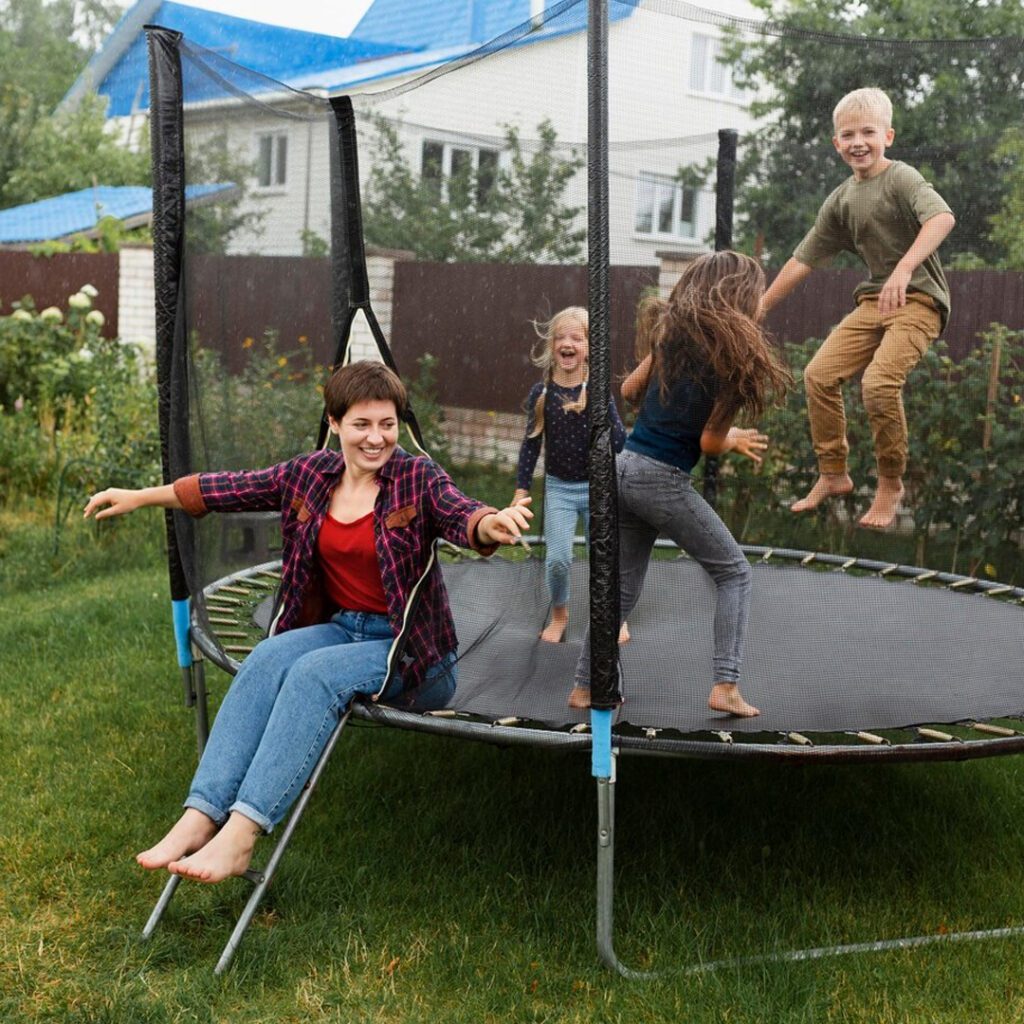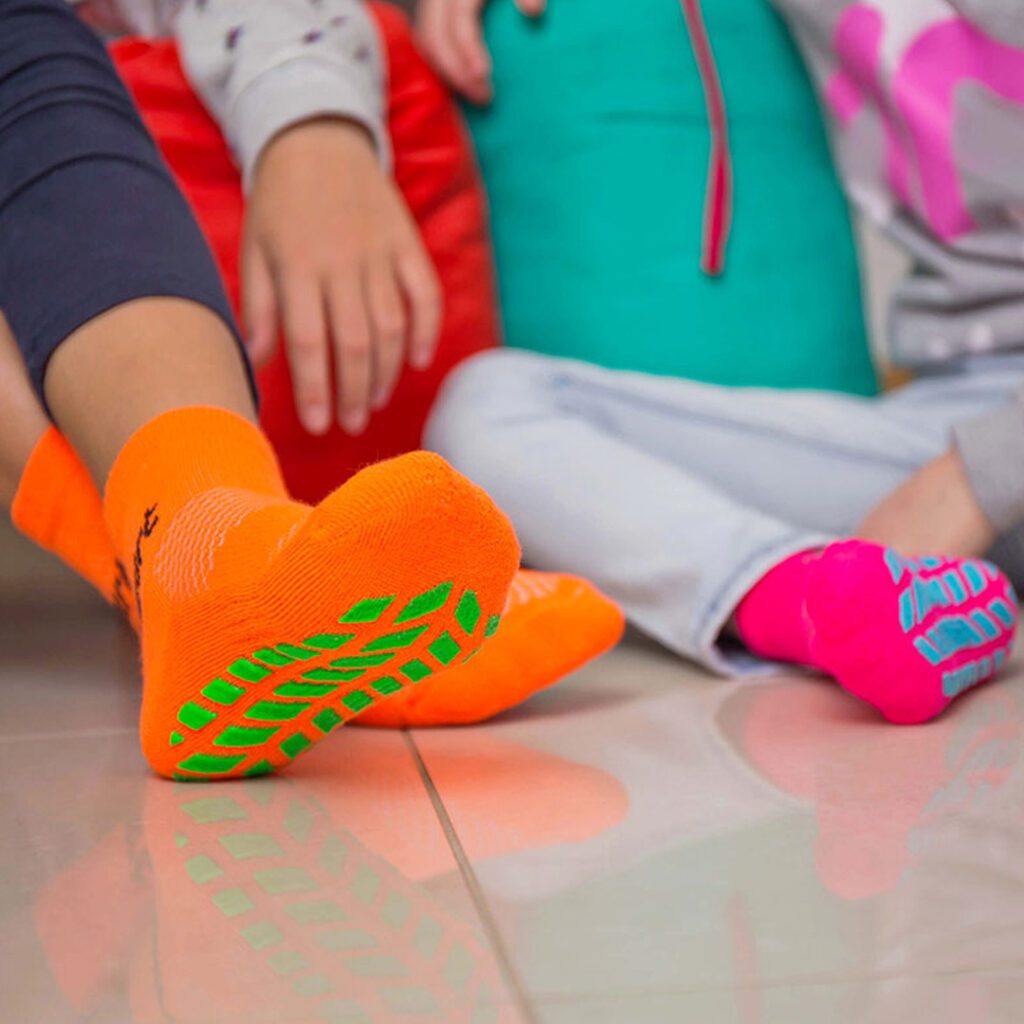Parents are our guiding light, offering protection and steadfastness through life’s challenges. As we explore the world, they offer a protective home that guarantees security and comfort. Yet, amidst their many responsibilities, self-care often gets neglected. Ask a parent about their favourite hobby or the last time they treated themselves, and you’ll likely get a blank stare. This neglect leads to stress and emotional strain for both parents and children.
Parental self-care is essential, not a privilege. Activities like bouncing on a trampoline go beyond exercise; they spark playfulness and rejuvenate the spirit. By prioritising self-care, parents recharge and set a positive example for their children. Ready to bounce back to a joyful family life?
Discover why self-care is crucial, recognize when you need a break, and see how trampolining can bring laughter and relaxation into your routine. Embrace self-care and transform your parenting journey, reclaiming joy and tranquillity, even in the busiest schedules.
Let’s leap into a happier, healthier you!
Why Self-Care is Essential for Parents

Parenting is demanding and often takes a significant toll on mental and physical health. The constant juggling of responsibilities, from managing household chores to meeting the emotional needs of children, can be overwhelming. This relentless pace can lead to stress, burnout, and self-criticism if not addressed properly.
Self-care is essential for parents for several reasons:
-
- Cope with Stress: Taking time for yourself helps manage stress levels. Engaging in activities that bring joy and relaxation can significantly reduce the daily pressures of parenting.
-
- Eliminate Self-Criticism: Practising self-care allows parents to silence that inner critic. By nurturing themselves, parents can build a more positive self-image, leading to increased confidence and satisfaction.
-
- Prevent Burnout: Regular self-care practices prevent burnout. Whether it’s a quiet moment with a book or a fun session on an inground trampoline, these activities help recharge your batteries and keep you energised.
-
- Be a Better Role Model: When parents take care of themselves, they set a powerful example for their children. Demonstrating the importance of self-care teaches kids to value their well-being and manage stress healthily.
-
- Stay Focused and Fit: Physical activities, such as trampolining, not only improve fitness but also enhance mental clarity and focus. A healthy body supports a healthy mind, enabling parents to stay sharp and attentive.
By prioritising self-care, parents improve their overall well-being and effectiveness. Embrace these practices to enhance your resilience, positivity, and ability to handle the demands of parenting with grace.
By understanding the critical role self-care plays in maintaining your well-being, it’s equally important to recognize the signs that indicate when you need a break. Let’s explore the symptoms that signal parents need self-care.
Parents Need Self-Care
Recognizing the signs of burnout and stress is crucial for parents. Early detection allows you to take steps to address these issues before they escalate. Here are some common symptoms that indicate it’s time to prioritise self-care:
-
- Fatigue: Constant exhaustion that doesn’t go away with rest is a red flag. If you’re always tired, it’s a sign your body and mind need a break.
-
- Irritability: Feeling more short-tempered or easily annoyed than usual? This heightened irritability often stems from being overwhelmed and stressed.
-
- Lack of Motivation: Losing interest in activities you once enjoyed can indicate burnout. When motivation wanes, it’s time to evaluate your self-care routine.
-
- Changes in Sleeping or Eating Habits: Noticeable changes, like insomnia, oversleeping, loss of appetite, or overeating, can signal that stress levels are too high.
-
- Headaches, Dizziness, or Stomach Upset: Physical symptoms like these often accompany prolonged stress and need attention.
-
- Feeling Unhappy, Anxious, or Lonely: Persistent negative emotions, such as sadness, anxiety, or loneliness, are significant indicators that you need to care for your mental health.
-
- Difficulty in Concentrating: Struggling to focus on tasks or making decisions can result from mental fatigue and stress.
-
- Criticising Yourself: Constant self-criticism or feeling inadequate as a parent signals a need for self-compassion and care.
Recognizing these symptoms early can prevent them from worsening and help you take proactive steps toward better self-care. Now, let’s explore how incorporating fun activities, like trampolining, can help alleviate these stressors and bring joy back into your life.
How Incorporating Sport Trampoline Can Help

Trampolining offers a fantastic way for parents to boost their physical and mental health while injecting fun into their routines. Here’s how bouncing on a trampoline can make a difference:
-
- Stress Relief: Jumping on a family trampoline helps release endorphins, the body’s natural stress relievers. Just a few minutes of bouncing can leave you feeling more relaxed and rejuvenated.
-
- Cardiovascular Exercise: Trampolining is an excellent cardiovascular workout. It improves heart health, increases stamina, and burns calories, all while being gentle on the joints compared to other high-impact exercises.
-
- Mood Enhancement: The rhythmic motion of bouncing stimulates the release of serotonin, which enhances your mood and can help combat feelings of anxiety and depression.
-
- Sense of Playfulness: Trampolining brings out your inner child, promoting a playful mindset. This playfulness can help you break free from daily stresses and enjoy the moment.
-
- Strengthening Family Bonds: Incorporating trampoline time into family activities strengthens bonds. Parents and children can jump together, play games, and share laughter, creating cherished memories.
Activities on trampoline
Parents can enjoy various activities on a trampoline, such as:
-
- Simple Bouncing: Start with basic jumps to get the blood flowing and experience the joy of weightlessness.
-
- Jumping Jacks: Combine the benefits of jumping with the traditional exercise to enhance coordination and muscle tone.
-
- Bounce and Reach: Jump and try to touch the sky, reaching for imaginary stars. This activity stretches the body and improves flexibility.
-
- Trampoline Games: Engage in fun games like “Simon Says” or “Follow the Leader” to encourage creativity and bonding.
-
- Meditative Bouncing: Use gentle, rhythmic bouncing as a form of moving meditation to calm the mind and reduce stress.
Safety Measures for Parents on Trampoline

Ensuring safety while enjoying trampoline activities is crucial for a fun and injury-free experience. Here are essential safety measures parents should take:
-
- Install a Safety Net: Surround your trampoline with a safety net to prevent falls. This enclosure acts as a protective barrier, ensuring that bouncers stay within the trampoline’s bounds, reducing the risk of accidents.
-
- Use Trampoline Ladders: Trampoline ladders provide a safe and easy way to climb on and off the trampoline. This prevents awkward climbs and potential falls, especially for younger children or anyone with limited mobility.
-
- Opt for High-Quality Springs: Invest in a trampoline with high-quality trampoline springs for a smooth and controlled bounce. Durable springs ensure better performance and reduce the risk of malfunction, making your jumping sessions safer.
-
- Wear Trampoline Socks: Trampoline socks enhance grip and reduce the risk of slipping. These specialised socks have non-slip soles, providing better traction and stability while jumping, which helps prevent injuries.
By incorporating trampolining into your routine, you can experience these health benefits and bring more joy with safety and connection into your family life. Now, let’s explore some other self-care ideas that can further enhance your well-being.
Some Self-Care Ideas for Parents
Taking time for self-care is essential for maintaining balance and well-being amidst the demands of parenting. Here are practical tips and activities that parents can incorporate into their routines:
-
- Mindfulness Exercises: Practise deep breathing, meditation, or yoga to reduce stress and increase mindfulness.
-
- Engage in Hobbies: Rediscover old hobbies or explore new ones that bring joy and relaxation, such as painting, gardening, or playing a musical instrument.
-
- Outdoor Activities: Spend time outdoors hiking, biking, or simply enjoying nature, which can refresh your mind and body.
-
- Social Media Detoxification: Take breaks from social media to reduce screen time and focus on meaningful interactions or personal activities.
-
- Pamper Yourself: Treat yourself to a spa day or indulge in a favourite meal to rejuvenate both body and spirit.
-
- Visit a Trampoline Park with Your Children: Enjoy quality family time while getting active and having fun together.
-
- Movie Night: Head out to the movies or create a cosy movie night at home with popcorn and your favourite films.
-
- Date Night: Plan a date night with your spouse to reconnect and unwind away from daily responsibilities.
Finding activities that bring joy and relaxation is key to recharging and being the best parent you can be. Whether it’s pursuing a hobby, enjoying quality time with family, or pampering yourself, prioritise self-care to maintain a healthy balance in your life.
Conclusion
Prioritising self-care isn’t just beneficial—it’s essential for parents navigating the challenges of family life. By nurturing their well-being, parents can effectively manage stress, maintain resilience, and set a positive example for their children.
Trampolining emerges as a playful and effective self-care tool, offering not only physical exercise and stress relief but also precious moments of joy and bonding with loved ones. The laughter shared on a trampoline rejuvenates spirits and strengthens family connections.
It’s time for parents to be a little selfish in the best way possible—by investing in their health and happiness. This self-care isn’t just for them; it creates a nurturing environment where families can thrive together.
Let’s embrace self-care as a cornerstone of parenting, ensuring both parents and children flourish in a balanced and joyful household. Start prioritising your well-being today and witness how it transforms your life for the better.
Trampolining releases endorphins, reduces stress, and enhances mood, contributing positively to mental health.
Yes, trampolining provides sensory stimulation and improves proprioception, which is beneficial for sensory processing.
Rebounding can help reduce anxiety by releasing tension, increasing endorphin levels, and providing a fun, rhythmic exercise.
Trampolining can improve social skills through group activities, fostering teamwork, communication, and shared enjoyment.
Therapeutically, trampolines are used for physical rehabilitation, improving balance, coordination, and overall physical fitness in a low-impact manner.





